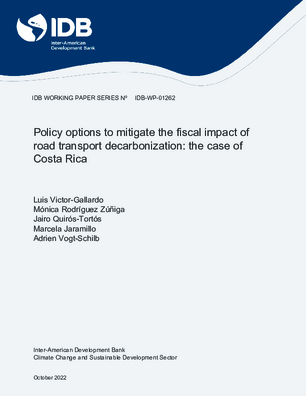Policy options to mitigate the fiscal impact of road transport decarbonization: the case of Costa Rica
Date
Jul 2021
Decarbonizing road transport through electrification, public transport, and walking and biking can increase productivity and reduce expenses thanks to reduced traffic and energy efficiency gains. However, governments face losing fuel and vehicle tax revenue. We develop a method to assess options to maintain fiscal revenues without hampering decarbonization benefits. We estimate the financial impact of the transition on the government, firms (buses, taxis, freight, and other private uses), and households grouped by income level and region of residence. Then, we evaluate the impact of energy, property, import, and distance-based tax adjustments on these actors. We apply the method to Costa Rica, a country committed to reaching net-zero emissions by 2050 and where 20% of government revenue comes from transport taxes. Decarbonizing transport would cause a fiscal impact of -0.41% of GDP on average between 2023-50, which is lower than the financial benefits on households and firms: 1.49% of GDP. We show that a combination of tax adjustments would eliminate the fiscal impact while maintaining net benefits for all firms and households of all income levels and regions of residence.




